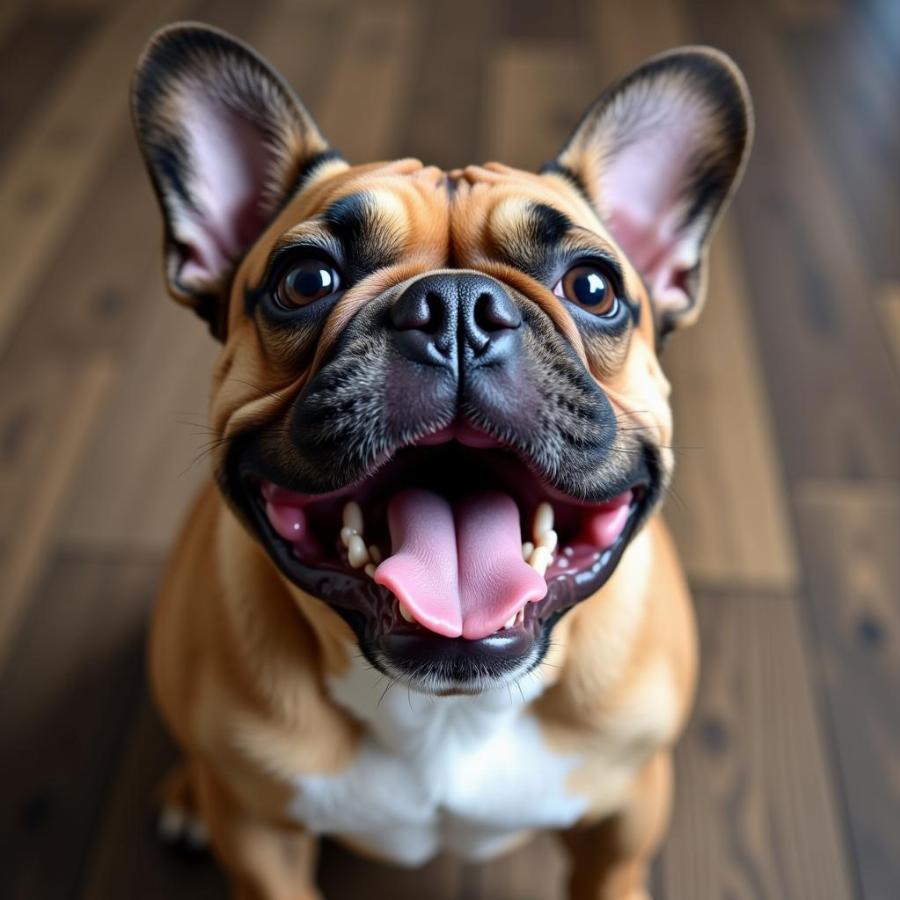The term “dog without a snout” often refers to brachycephalic breeds, those adorable pups with characteristically short noses and flat faces. While undeniably cute, this unique facial structure can lead to a range of health issues. Understanding these potential problems is crucial for any prospective or current owner of a brachycephalic breed. This article will delve into the world of these short-nosed companions, exploring their specific needs, potential health concerns, and responsible ownership.
Brachycephalic Breeds: A Closer Look
Brachycephaly, meaning “short head,” describes the skull shape of breeds like French Bulldogs, Pugs, English Bulldogs, and Boston Terriers. Their shortened nasal passages and flattened faces are a result of selective breeding, often prioritizing aesthetics over function. While this has resulted in their undeniably charming appearance, it’s also the root of many health challenges.
Common Health Issues in Brachycephalic Dogs
The compressed airways of brachycephalic breeds often lead to Brachycephalic Obstructive Airway Syndrome (BOAS). This condition can manifest as noisy breathing, snoring, exercise intolerance, and even difficulty breathing in hot or humid weather. Other common issues include eye problems, skin fold infections, and dental overcrowding.
 Brachycephalic Dog Breathing Difficulties
Brachycephalic Dog Breathing Difficulties
Caring for a Brachycephalic Dog
Owning a brachycephalic breed requires a proactive approach to health management. Regular veterinary checkups are essential for early diagnosis and treatment of potential problems. Maintaining a healthy weight is also crucial, as obesity can exacerbate breathing issues. Special attention should be paid to their skin folds, keeping them clean and dry to prevent infections.
Tips for a Healthy Brachycephalic Dog
- Controlled Exercise: Avoid strenuous activity, especially in hot weather. Opt for short, gentle walks and indoor playtime.
- Temperature Regulation: Provide a cool, comfortable environment, and avoid exposing them to extreme temperatures.
- Harness, Not Collar: Use a harness instead of a collar to avoid pressure on the trachea.
- Specialized Diet: Consider a diet formulated for brachycephalic breeds, which often addresses their specific chewing and digestive needs.
Is a Brachycephalic Breed Right for You?
While brachycephalic breeds are undeniably charming, their health needs require dedicated care and attention. Potential owners should be prepared for the financial and emotional commitment involved in managing their health. Responsible breeding practices are also crucial in mitigating the prevalence of BOAS and other health issues.
Choosing a Responsible Breeder
If you’re considering a brachycephalic breed, choosing a responsible breeder is paramount. Look for breeders who prioritize health testing and focus on improving the breed’s overall well-being. Ask about the parents’ health history and be wary of breeders who prioritize aesthetics over function.
Conclusion
“Dog without a snout” describes the endearing, yet often challenging, reality of brachycephalic breeds. While their unique appearance is captivating, potential owners must be fully aware of the health responsibilities involved. By understanding their specific needs and prioritizing proactive care, we can ensure these charming companions live long, healthy, and fulfilling lives.
FAQ
- What is BOAS? BOAS stands for Brachycephalic Obstructive Airway Syndrome, a common breathing disorder in short-nosed dogs.
- Are all brachycephalic dogs unhealthy? Not all, but they are predisposed to certain health issues due to their anatomy.
- How can I keep my brachycephalic dog cool? Provide access to shade, air conditioning, and cool water, especially in hot weather.
- What kind of harness should I use? A well-fitted harness that distributes pressure evenly across the chest.
- Are there special diets for brachycephalic dogs? Yes, some diets are formulated to address their chewing and digestive needs.
- What are some common brachycephalic breeds? French Bulldogs, Pugs, English Bulldogs, and Boston Terriers.
- How can I find a responsible breeder? Research breed-specific rescue organizations and reputable breeders who prioritize health testing.
Related Articles You Might Find Helpful:
- dog bowls for flat nose dogs with a raised wall Just like choosing the right harness, selecting an appropriate dog bowl can greatly impact your brachycephalic dog’s mealtimes.
- dog bowl to slow eating For some brachycephalic dogs, a slow-eating bowl can further assist with comfortable mealtimes. Discover the benefits in this article.
- couch potato dog While brachycephalic breeds might need adjusted exercise routines, every dog needs some downtime. Check out our tips for encouraging healthy rest.
Beaut Dogs is your trusted source for all things dog-related, providing expert advice on breed selection, care, and responsible ownership. For personalized support, contact us at Email: [email protected]. Beaut Dogs is committed to helping you navigate the wonderful world of canine companionship. We believe every dog, regardless of breed, deserves a happy and healthy life. Visit us at https://beautdogs.com today!